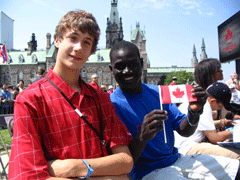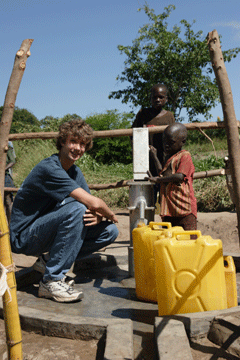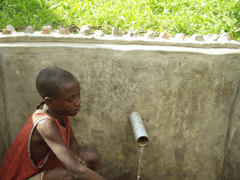"Well"-being
Air Date: Week of October 27, 2006

Ryan and Jimmy on Parliament Hill in Canada on July 1, 2006. Ryan was recognized as a Young Canadian Achiever in front of 50,000 people. (Courtesy of: Ryan’s Well Foundation.)
When Ryan Hreljac was six years old he learned that many areas around the world did not have access to clean water. Ryan decided to raise money to build a well in a village in Uganda. Akana Jimmy lived in that village and the boys became penpals and fast friends. Ten years later, Ryan and Jimmy join host Steve Curwood to share their story and to discuss Ryan’s continuing efforts to bring water to other struggling villages.
Transcript
CURWOOD: It’s Living on Earth. I’m Steve Curwood.
At age six, Ryan Hreljac found out that not everyone in the world had access to water the way he and his family did in their home in Canada. He was also told that building a well in Africa would only cost seventy dollars. So even though he was only in grade one, Ryan set out on a mission: to raise the money to build a well for Agweo, a village in Uganda where people spend hours every day searching for water.
In his quest, Ryan found out it would cost much more but that didn’t stop him. And once the well was drilled, he went to Africa and met Akana Jimmy, an orphan in the village, and their paths have been intertwined ever since. Now, almost ten years after that meeting, Ryan and Jimmy join me in the studio to share their story and talk about the Ryan’s Well Foundation which is bringing water to other struggling villages in Third World countries.
Ryan and Jimmy, welcome to Living on Earth.
HRELJAC: Thanks for having us.
AKANA: Thank you.
CURWOOD: So, Ryan, how is it that a first grade boy decides to go into the African well business?
HRELJAC: Well, it was just the fact that I could walk nine steps out of my classroom and get a drink from the water fountain, whereas on the other side of the world, people didn’t have that. People had to walk five kilometers to get to a dirty mudhole that contained diarrhea and worms and diseases, and had to live off that. And I felt I was in a position to do something about it, so I did. And then one thing led to the next. Public speaking was around the corner. More people started to help. And, now, we’ve gotten to the point where we’ve raised about 1.5 million dollars, helped almost 400,000 people in eleven developing countries.

Ryan and Jimmy on Parliament Hill in Canada on July 1, 2006. Ryan was recognized as a Young Canadian Achiever in front of 50,000 people. (Courtesy of: Ryan’s Well Foundation.)
HRELJAC: Well, in my grade two class, my grade two teacher found out what happened in grade one and said, ‘wow, what a pretty good story,’ and thought, ‘why don’t we expand on this and get penpals at the school where the first well was built.’ So, we all got penpals at Angolo Primary School in northern Uganda, and my penpal ended up to be someone named Jimmy. (laughs)
CURWOOD: And so after a while you go to Uganda to meet Jimmy and see the village where this well has been put in, the well that you helped raise the money for. And, Jimmy, I’m wondering if you could describe for us the day when you knew Ryan was arriving.

Ryan in the Ogur subcounty, Lira District of Uganda. (Courtesy of: Ryan’s Well Foundation.)
HRELJAC: When I went to Jimmy’s school and I got to see all of the people clapping on the road; there was a huge celebration that lasted five hours. There was a big meal and everyone was so happy just because they had clean water to drink. And, I don’t know about you, but a smile doesn’t light up on my face because I can have a shower every morning. It just makes you put everything in perspective.
CURWOOD: So, Jimmy, tell me about your village, Agweo, in Uganda. The rebel group, I think it was known as the Lord’s Resistance Army, comes through one day attacking your village. What happened to you and how were you able to escape?
AKANA: Well, it was kind of luck. They come at night and they found me sleeping in my little house. And they arrested me and tied my hand. And they brought me outside, but I made a decision. Instead of just staying with them, waiting to get killed, I would run away or just follow them. My hand was tied, so I just bite the rope, keep biting the rope, and the rope untied and I just started running away. And I come in the morning, everything was burned down. There was no one left at all.
CURWOOD: You bit through the rope that had you tied up. You ran away into the bush, and the next morning, you come back to your village and everything is burned down?
AKANA: Yeah, all the houses. Some of my cousins were killed, too. Some were captured.
CURWOOD: So, where did you go?
AKANA: I came back that morning and I met a friend of ours. His name called Tom Omach. And by that time, we were, Ryan and I, we were in connection, so Tom sent a letter to Ryan’s family, and said Jimmy is in, kind of in trouble. By that time, they were sending a couple monies to help me for schooling because in Uganda you have to pay for school when you reach to grade six. And Tom told them the story, and in 2003 I got invited to Canada as a visitor. But some miracles happen and now I’m ended up to be living in Canada now.
CURWOOD: Now, I’m wondering how you feel, Jimmy, about the fact that you were able to escape when bad things came to your village and so many people were not.
AKANA: Sometime when I sit down and start thinking what’s happening back there, it make me feel kind of guilty living in such a fortunate world. And while those people, back there, always sleeping in a bush, and they have nothing. But when I was back there, I thought that the world is, like, all equal; that the same thing that we were experiencing, that other people are also experiencing. But that’s not the way it seem to be though.
CURWOOD: Jimmy, what’s life like for you today? Are you working, you going to school? What’s going on?
AKANA: Right now I’m a student. I go to Saint Michael. I’m in grade twelve now in the high school, so -- (laughs).
HRELJAC: Jimmy’s very modest about his stuff. He’s also on the cross-country team.
CURWOOD: Psst. Ryan, how good is he on the cross country team?
HRELJAC: (whispers) He’s not very good.
AKANA: (laughing) I run like a taurus!
HRELJAC: I’m just kidding.
AKANA: You know--
HRELJAC: Really, right now, what we found right now is wrestling is his strength.
AKANA: No, not really. Just do--
HRELJAC: Out of all the North American food he’s eaten, he was a good runner when he first got here, but then as he started to eat more food.
(Everyone Laughs)
AKANA: That’s not true! (laughing)
CURWOOD: (whispering) Jimmy. Psst. Hey, Jimmy.
AKANA: (whispering) Yes, yes?
CURWOOD: (whispering) Tell me about Ryan.
AKANA: (laughs)
CURWOOD: What’s he really like?
AKANA: Oh, it’s like the way he sounded. He sound pretty good. That’s the way he is.
CURWOOD: OK, Ryan, so what’s your next project?
HRELJAC: Well, right now we’re just trying to facilitate as many water projects as possible. We’re working in all over Africa and South America. We just finished our few projects in India. And as we grow, we’ll try to do even more to make the world a bit more equal.
CURWOOD: Recently, the world got together and set millennium goals to say that there are all these people, about a billion people, without enough fresh water, and that by the year 2015 that we should get fresh water at least to half of them. How do you feel about that? Is fresh water for half of the people in the world who don’t have it by the year 2015, is that soon enough?

This is a spring well, built in 2005 in Ruhinda Subcounty, Uganda. The spring well provides clean water for approximately 524 people. (Courtesy: Ryan’s Well Foundation.)
CURWOOD: The book is called “Ryan and Jimmy and the Well in Africa That Brought Them Together.” And that’s Jimmy Akana and Ryan Hreljac. I want to thank you both for taking this time.
HRELJAC: Thanks for having us.
AKANA: Thank you for having us.
Links
"Ryan and Jimmy And the Well in Africa That Brought Them Together"
Living on Earth wants to hear from you!
Living on Earth
62 Calef Highway, Suite 212
Lee, NH 03861
Telephone: 617-287-4121
E-mail: comments@loe.org
Newsletter [Click here]
Donate to Living on Earth!
Living on Earth is an independent media program and relies entirely on contributions from listeners and institutions supporting public service. Please donate now to preserve an independent environmental voice.
NewsletterLiving on Earth offers a weekly delivery of the show's rundown to your mailbox. Sign up for our newsletter today!
 Sailors For The Sea: Be the change you want to sea.
Sailors For The Sea: Be the change you want to sea.
 The Grantham Foundation for the Protection of the Environment: Committed to protecting and improving the health of the global environment.
The Grantham Foundation for the Protection of the Environment: Committed to protecting and improving the health of the global environment.
 Contribute to Living on Earth and receive, as our gift to you, an archival print of one of Mark Seth Lender's extraordinary wildlife photographs. Follow the link to see Mark's current collection of photographs.
Contribute to Living on Earth and receive, as our gift to you, an archival print of one of Mark Seth Lender's extraordinary wildlife photographs. Follow the link to see Mark's current collection of photographs.
 Buy a signed copy of Mark Seth Lender's book Smeagull the Seagull & support Living on Earth
Buy a signed copy of Mark Seth Lender's book Smeagull the Seagull & support Living on Earth

